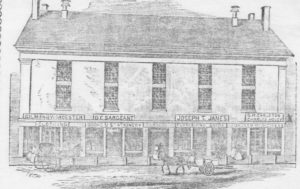John Levy (Levi) (1797 – 1878) was born a free black man on the Island of Nevis, West Indies. Levy arrived in Boston about 1820. In 1826, he was encouraged to move his family to Lowell. Here, he opened a Hairdresser Shop on East Merrimack Street to serve the female textile workers in the new Town of Lowell. That said, Levy faced serious resistance from people in Lowell when trying to settle here. In a biography co-written with his daughter, he recounts, “[I] began to discuss the question [of abolition] with my customers, in my shop… I had read much and reflected deeply…” Levy was active in local anti-slavery groups, including the Lowell Woman’s Anti-Slavery Society. With other activists such as Maria Chapman and Sarah Clay, Levy worked to organize anti-slavery fairs held in City Hall (now Old City Hall, the building you are standing beside).
More of the Story
John Levy (Levi) (1797-1871) was born a free black on the Island of Nevis, West Indies, his father Daniel Levy and his mother Nancy were free blacks. The Levys were slaveholding, plantation owners, their ancestors were part of the African Jewish Diasporas to the Island of Nevis.
Initially, John Levy apprenticed as a seaman with one of his father’s friends and eventually worked aboard ships throughout the Caribbean, and then across the Atlantic to the Isle of Man, Liverpool, London, and Greece.
Levy arrived in Boston about 1820 and was working at Harvard College as a waiter when on July 8, 1822 he married Sophia Lewis (1794-1852) daughter of Minor and Peter Lewis (See: Lowell Black History Story, Friday, February 5th).
In 1826, Levy was recruited to move his family to Lowell. Here he opened a Hairdresser Shop on East Merrimack Street to serve the female textile workers in the new Town of Lowell. Advertisement Merrimack Journal, Lowell, 1826: “John Levi – Has for sale a large assortment of FASHIONABLE CURLS, at his shop near Kimball’s Hotel, Belvidere.” (East Merrimack Street).
John Levy recounts “began to discuss the question [of abolition] with my customers, in my shop…I had read much and reflected deeply…” About 1832, Levy joins the New England Anti-Slavery Society. Organized in 1831 by William Lloyd Garrison, editor of “The Liberator,” it expanded and became the Massachusetts Anti-slavery Society an auxiliary of the American Anti-Slavery Society in 1835. The Society sponsored dozens of lecturers or “agent” who traveled throughout New England, speaking in local churches and halls. In 1834, John Levy becomes an “agent” and correspondent for William Lloyd Garrison’s “The Liberator.”
The Massachusetts Anti-Slavery Society helped arrange annual anti-slavery conventions and organized fundraising fairs. Levy attended and addressed the 1837 Anti-Slavery Convention. He was also a paid organizer for the Annual Boston Anti-Slavery Bazaars.
John Levy Assisted Freedom Seekers:
1841 Amistad Africans. “Visit to the United State in 1841” by Joseph Sturge. “… we proceeded to Lowell. The heavy rain prevented a general attendance. Only thirty-one dollars was collected, beside some private donations. Mr. John Levi, a colored citizen, rendered important services to us, and several of the clergymen and other inhabitants rendered efficient aid.
1843 Zadock Myers. “Lowell Courier,” Lowell, 1843. “Mr. John Levy received a letter from Zadock Myers of Frederick, Maryland, with the intelligence that he has succeeded in precuring the liberation of his family from slavery. Mr. Myers receiver pecuniary assistance, to enable him to purchase his family, from many citizens of Lowell, who will be glad to hear of his success.”

In Mar 1843, John Levy worked with Maria Chapman (Boston), and Sarah Clay (Lowell) to reestablish the Lowell Woman’s Anti-Slavery Society and organize anti-slavery fairs held in City Hall, Merrimack Street, Lowell (now Old City Hall.)
In the 1840s, along with William Lloyd Garrison and Frederick Douglass, John Levy and others organized a series of one hundred anti-slavery conventions through out Massachusetts. In 1843 and 1844, they arranged Frederick Douglas to speak at the Lowell Anti-Slavery Convention. According to historian Charles Cowley, Douglass was hosted by Abolitionist and Quaker Royal Southwick, superintendent of the Lowell Carpet Company. (note: University of Massachusetts Lowell, Southwick Hall was funded by his grandson Frederick C. Ayer.)
John Levy Supported Underground Railroad Conductor:
Charles Turner Torrey, Massachusetts, minister and reporter, jailed in Maryland after assisting 400 slaves to freedom. “Middlesex Standard,” Lowell, 1844. Followed efforts of the Lowell, Massachusetts Torrey Committee formed to raise money for the defense of Charles Turner Torrey.
John Levy, his second wife Henrietta Williams, and their six children moved to the new City of Lawrence in 1846. Lowell Courier Announcement: “Mr. John Levy has removed to the new city, and opened a barber’s shop there.” Over the next 25 years, Levy continued to work for the civil rights of black citizens – at times living in Steuben, New York, Williamstown, Massachusetts, and returning occasionally to Lowell and Lawrence.
John Levy’s closing remarks in his edited autobiography “And now kind readers, you may find me sitting by my fireside at South Lawrence, at the age of seventy-four years. Were I to enter into a minute detail of my life and career, — especially in the part I took in the Abolition cause, from the year 1832 to the end of slavery, — the matter would fill a bulky volume and perhaps exhaust the patience of whom this small work may be, in some degree interesting. I thank God I lived to ratify the Fifteen Amendment in the City of Boston. (Fifteen Amendment: The right of citizens of the United States to vote shall not be denied or abridged by the United States or by any State on account of race, color, or previous condition of servitude.)
John Levy died March 25, 1879 in North Andover.
(Thanks University of Lowell Libraries)
![Letter from John Levy, Lowell, [Massachusetts], to Maria Weston Chapman, 1843 July 15](https://diylowell.org/wp-content/uploads/2022/12/39999085866216_0001.jpg)
